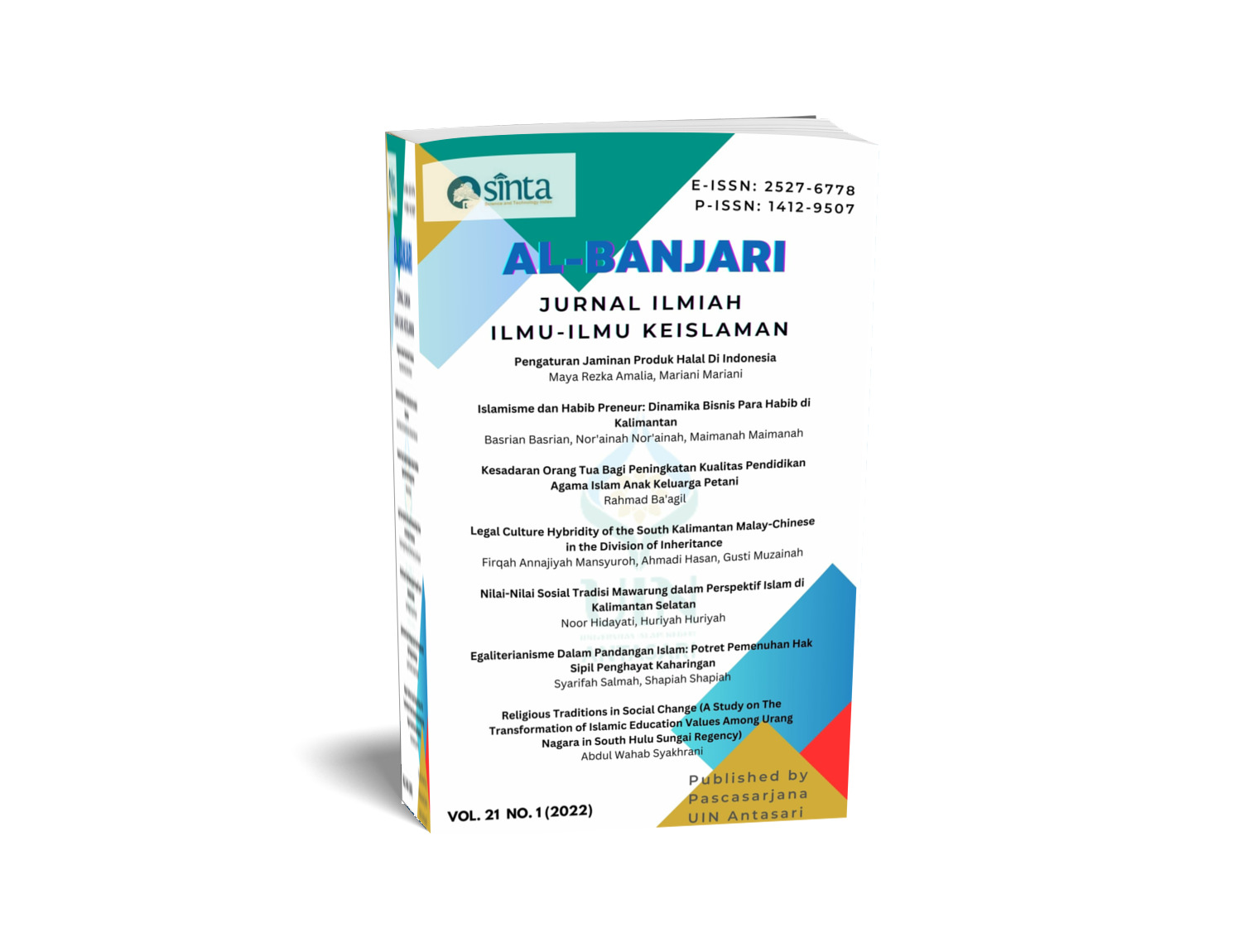Kesadaran Orang Tua Bagi Peningkatan Kualitas Pendidikan Agama Islam Anak Keluarga Petani
DOI:
https://doi.org/10.18592/al-banjari.v21i1.6334Keywords:
Anjir Pasar Lama, Islamic Education, Farming FamiliesAbstract
One of the phenomena of poverty that occurs in this community is in Barito Kuala which is one of the rice granaries in South Kalimantan, namely in Anjir Pasar Lama village, Anjir Pasar district. The role of parents with backgrounds in Anjir Pasar Lama Village in Islamic religious education can be done to ensure that children start from TKA/TPA Al Quran in Anjir Pasar Lama Village, take their children to the local Koran teacher and visit the Taklim assembly, even though have to travel quite a distance. Determination of data sources in this study is to use purposive sampling, namely: selected people who will be asked questions, and the questions according to the specific characteristics of the sample, purposively until the data collected is deemed sufficient. The family as one of the centers of education can be said to be still not maximized due to the feelings of parents who feel they are not 'worthy' or marginal. In addition, the intention of parents to send their children to a higher level tends to be non-existent. This is because parents are "realistic" with unsupportive economic conditions. However, for the religious education of farming families, it tends to be better in its application.References
Ahmadi, Abu. Psikologi Sosial. Jakarta: Rineka Cipta, 2002.
Aminah, Siti, and Narni Farmayanti. Pemberdayaan Sosial Petani-Nelayan. Jakarta: Yayasan Obor Indonesia, 2014.
Badan Pusat Statistik Kabupaten Barito Kuala. Kecamatan Anjir Pasar Dalam Angka. Barito Kuala: BPS Kabupaten Barito Kuala, 2020.
Djaelani, Mohammad Solikodin. ‘Peran Pendidikan Agama Islam Dalam Keluarga Dan Masyarakat’. Jurnal Ilmiah WIDYA 1, no. 2 (2013): 100–105.
Elizabeth, Roosganda. ‘Fenomena Sosiologis Methamorphosis Petani: Ke Arah Keberpihakan Pada Masyarakat Petani Di Pedesaan Yang Terpinggirkan Terkait Konsep Ekonomi Kerakyatan’. Forum Penelitian Agro Ekonomi 25, no. 1 (2007): 29–42.
Hasan. ‘Islam Dan Budaya Banjar Di Kalimantan Selatan’. Ittihad Jurnal Kopertais Wilayah XI Kalimantan 14, no. 25 (2016): 78–90.
Khoiriyah, Nur. ‘Pandangan Sosial Ekonomi Dan Keagamaan Masyarakat Petani Jawa’. Islamic Review Jurnal Riset Dan Kajian Keislaman VI, no. 2 (2017): 233–47.
Koentjaraningrat. Kebudayaan, Mentalitas, Dan Pembangunan. Jakarta: Gramedia, 2015.
Makhmudah, Siti. ‘Penguatan Peran Keluarga Dalam Pendidikan Anak’. Martabat : Jurnal Perempuan Dan Anak 2, no. 2 (2018): 269–86.
Pandaleke, Alfien. Sosiologi Perkotaan. Bogr: Maxindo Internasional, 2015.
Santika, Tika. ‘Peran Keluarga, Guru, Dan Masyarakat Dalam Pembentukan Karakter Anak Usia Dini’. JUDIKA (Jurnal Pendidikan Uniska) 6, no. 2 (2018): 77–85.
Sekretariat Negara. Undang-undang Nomor 52 Tentang Perkembangan Kependudukan dan Pembangunan Keluarga (2009).
Sunarti, Euis, and Ali Khomsan. ‘Kesejahteraan Keluarga Petani, Mengapa Sulit Diwujudkan’. Institut Pertanian Bogor, 2006.
Syaefuddin. ‘Kesadaran Keluarga Petani Terhadap Pentingnya Pendidikan Formal’. Jurnal Psikologi Integratif 6, no. 1 (2018): 62–80.
Ulwan, Abdullah Nashih. Pedoman Pendidikan Anak Dalam Islam. Semarang: CV. Asy-Syifa, 2014.
Downloads
Published
Issue
Section
License
Copyright (c) 2022 Al-Banjari : Jurnal Ilmiah Ilmu-Ilmu Keislaman

This work is licensed under a Creative Commons Attribution-ShareAlike 4.0 International License.
Authors who publish with this journal agree to the following terms:
- Authors retain copyright and grant the journal right of first publication with the work simultaneously licensed under a Creative Commons Attribution License that allows others to share the work with an acknowledgement of the work's authorship and initial publication in this journal.
- Authors are able to enter into separate, additional contractual arrangements for the non-exclusive distribution of the journal's published version of the work (e.g., post it to an institutional repository or publish it in a book), with an acknowledgement of its initial publication in this journal.
- Authors are permitted and encouraged to post their work online (e.g., in institutional repositories or on their website) prior to and during the submission process, as it can lead to productive exchanges, as well as earlier and greater citation of published work (See The Effect of Open Access).


































